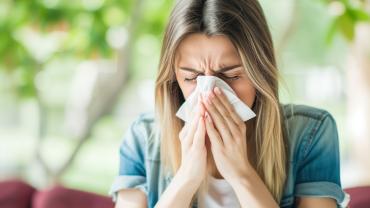
Summer is a season to be cherished – when the great outdoors beckons us to frolic in its beauty. There is only one downfall: allergies. Yes, the flowers and trees are glorious, but the sneezing is not. Fortunately, there are simple ways to beat the summer sneezes.
If you experience seasonal allergies, you are not alone. Approximately one-third of adults aged 18 and over were diagnosed in 2021 with seasonal allergies. An allergic reaction to the outdoors results from a buildup of histamine, a seemingly pesky neurotransmitter that signals our immune system of impending invaders. Why is our body reacting this way to a seemingly harmless substance?
When the body recognizes a potential environmental threat, such as antigens from environmental allergens, the antigen attaches to its respective receptors found on mast cells (certain types of immune cells). Through a complex orchestra of cellular reactions, the mast cell degranulates, releasing histamine into the extracellular space – producing a robust immune response. This exaggerated immune response can result in fever, sneezing, itching of the nose, eyes, mouth, runny or stuffy nose, redness and swelling in the eyes. By supporting a normal immune response through mast cell stabilization and histamine metabolism, the immune response to common environmental triggers can be mitigated and symptom severity may be better managed.
One such plant compound that may be especially appropriate during the summer months is bromelain, a proteolytic enzyme derived from the stem and fruit of pineapples. Bromelain has been shown to help reduce prostaglandin formation and supports antioxidant status, which may help attenuate occasional allergy-related complaints. One special thing about bromelain is that it has been shown to help a healthy inflammatory response by regulating prostaglandin activity. Bromelain has also shown efficacy in helping support the breathability of airways when exposed to conditions that may upregulate the inflammatory response. One clinical study on 40 patients found that those who consumed 500 mg of bromelain twice daily for one month experienced clearer sinuses.
Another plant compound in the tool kit is luteolin (Perilla frutescens), a flavonoid found in various fruits, vegetables, and herbs. Luteolin can help potentially reduce the urge to sneeze by lowering the amount of histamine released from those irritating mast cells. One proposed way luteolin seems to have this effect is through lowering certain immune cells known as antibodies. These specific antibodies, called immunoglobulin E (IgE) antibodies, communicate with mast cells to release histamine. A clinical study of 23 individuals with a history of allergic rhinitis observed that after supplementing with a combination of Perilla frutescens (a plant high in luteolin), vitamin D, and quercetin for 30 days, the subjects experienced a large reduction in nasal and eye symptoms, including less sneezing, blocked nasal airway, and itchy eyes. Further research is required to elucidate potential clinical benefits.
When life gives you lemons, you best make lemonade! That is because the vitamin C packed in those lemons may help give your immune system that extra boost it needs to help keep the sneezing away. Having low levels of vitamin C has been associated with increased histamine levels in the body, which suggests vitamin C may help promote normal histamine metabolism. Another reason vitamin C may support those with allergic reactions is through its antioxidant properties. Certain immune cells produce oxidative stress to protect the body, but unfortunately, this creates an inflammatory state that does not end well for those with allergies. The antioxidant properties of vitamin C can help rebalance this inflammatory state of the immune system.
To complement your summer strategies and help support healthy immune responses, consider integrating these nutrients and compounds into your health-promoting routine!
Interested in learning more? Read about the roles of stinging nettle and quercetin in fighting common environmental triggers.
By Melanie Luther, CHN, MS, and Bri Mesenbring, MS, CNS, LDN